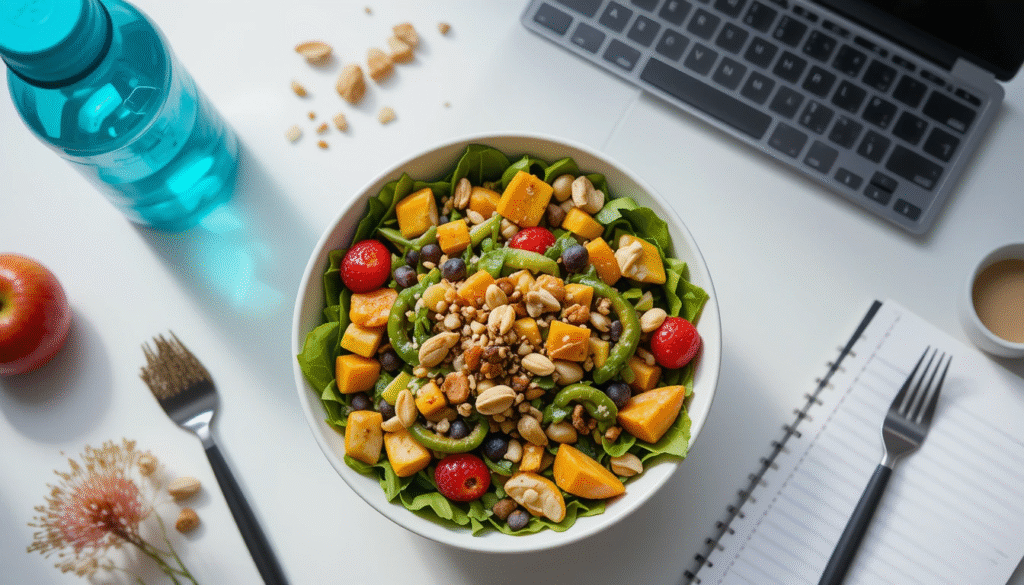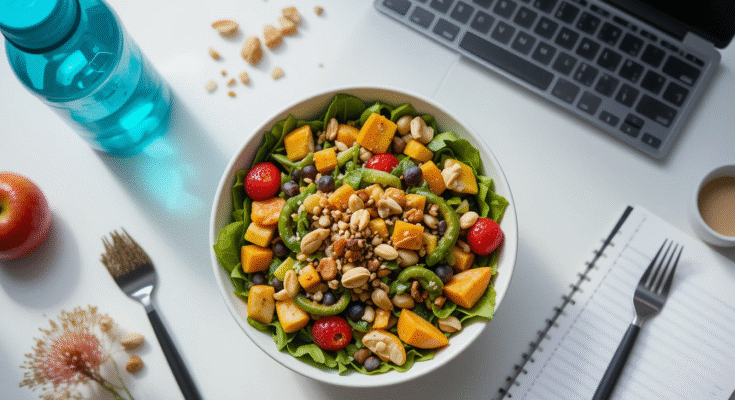
In today’s fast-paced world, maintaining a healthy diet often feels like an impossible task. Between long working hours, commuting, family responsibilities, and endless to-do lists, food choices can become an afterthought. Many people end up skipping meals, relying on fast food, or overeating late at night — habits that negatively affect health, energy levels, and even mood.
But the truth is: even with a busy schedule, healthy eating is possible. With the right planning, mindset, and small daily habits, you can fuel your body, boost productivity, and feel energized throughout the day. This article explores practical healthy eating habits for busy lifestyles that you can start adopting right away.
1. Start the Day with a Nutritious Breakfast
Breakfast is often called the “most important meal of the day,” and for good reason. A balanced breakfast jump-starts your metabolism, improves concentration, and reduces cravings later in the day.
Tips for a busy morning:
- Choose quick options like overnight oats, whole-grain toast with eggs, or smoothies.
- Keep fruits such as bananas, apples, or berries ready to grab.
- Avoid sugary cereals or pastries that cause energy crashes.
A simple protein + fiber combo in the morning can keep you satisfied until lunch.
2. Meal Prep and Plan Ahead
One of the biggest barriers to eating healthy is lack of time. Meal prepping — cooking or organizing meals in advance — solves this problem.
Benefits of meal prep:
- Saves time during the week
- Reduces unhealthy last-minute food choices
- Helps with portion control
How to start meal prepping:
- Dedicate 1–2 hours on Sunday to cook grains, proteins, and vegetables.
- Store them in portion-controlled containers.
- Use glass jars or boxes for easy reheating.
For example: grilled chicken, brown rice, and roasted vegetables can be mixed and matched for different meals.
3. Healthy Snacking on the Go
Busy people often snack between meetings, during travel, or while working late. Instead of chips or sugary snacks, prepare healthier alternatives.
Smart snack ideas:
- Nuts and seeds (almonds, walnuts, chia seeds)
- Greek yogurt with fruit
- Hummus with carrot or cucumber sticks
- Whole-grain crackers
- Protein bars with minimal sugar
Keeping these in your bag, office drawer, or car ensures you won’t reach for junk food when hunger strikes.
4. Stay Hydrated Throughout the Day
Often, what feels like hunger is actually thirst. Dehydration can cause fatigue, headaches, and poor concentration — common struggles for busy individuals.
Hydration tips:
- Carry a reusable water bottle everywhere.
- Set reminders on your phone or smartwatch to drink water.
- Infuse water with lemon, mint, or cucumber for flavor.
- Limit sugary drinks and sodas; choose water, green tea, or herbal teas instead.
Aim for 8–10 glasses of water daily, but adjust depending on your activity level and climate.
5. Balance Your Plate – The 80/20 Rule
A healthy diet doesn’t mean giving up your favorite foods completely. Following the 80/20 rule helps:
- 80% of your meals should be nutritious, whole foods.
- 20% can include occasional treats (pizza, dessert, fast food).
Balanced plate formula:
- Half: Vegetables and fruits
- One-quarter: Lean proteins (chicken, fish, beans, tofu)
- One-quarter: Whole grains (brown rice, quinoa, whole-wheat pasta)
This balance provides energy, keeps you full, and supports long-term health.
6. Avoid Skipping Meals
Skipping meals, especially lunch, is common among busy people. However, this often leads to overeating later in the day and slows metabolism.
Quick solutions when time is short:
- Wraps or sandwiches with whole-grain bread and lean protein
- Salad bowls with veggies, beans, and boiled eggs
- Ready-to-blend smoothies with frozen fruits and protein powder
Eating small, balanced meals regularly keeps energy steady and prevents binge eating at night.
7. Limit Processed and Fast Foods
Fast food and processed snacks are tempting because they are quick and convenient. However, they are often loaded with unhealthy fats, sugar, and sodium.
Better choices when eating out:
- Opt for grilled instead of fried items.
- Choose salads or vegetables as sides instead of fries.
- Pick water instead of soda.
- Avoid oversized portions — share if needed.
Remember: eating out occasionally is fine, but relying on fast food daily harms both energy and health.
8. Practice Mindful Eating
Being busy often leads to eating in front of a computer, phone, or TV. This habit causes overeating and reduces satisfaction from meals.
Mindful eating habits:
- Eat slowly and chew thoroughly.
- Avoid distractions while eating.
- Pay attention to hunger and fullness signals.
- Enjoy flavors, textures, and aromas.
Mindful eating not only improves digestion but also helps maintain a healthy weight.
9. Prepare “Emergency Meals”
There will be times when work piles up or you’re too tired to cook. Instead of ordering unhealthy takeout, keep quick and healthy options at home.
Examples:
- Canned beans, tuna, or chickpeas (for quick salads)
- Frozen vegetables (steam in minutes)
- Whole-grain pasta with simple tomato sauce
- Boiled eggs in the fridge
These backup meals save time, money, and health when emergencies strike.
10. Get Support and Stay Consistent
Sticking to healthy eating habits is easier with support. Encourage your family or coworkers to join you. Share meal prep ideas, exchange recipes, or even set group health goals.
Consistency is key. Even small changes — like drinking water regularly, swapping soda for tea, or eating more vegetables — add up over time.
Final Thoughts
A busy lifestyle does not have to mean unhealthy eating. By planning ahead, choosing smart snacks, staying hydrated, and practicing mindful eating, you can enjoy delicious, nutritious meals every day.
Remember, the goal is not perfection but progress. Small, consistent habits make the biggest difference in the long run. So the next time your schedule feels overwhelming, remind yourself: healthy eating is not about having time, it’s about making time.


